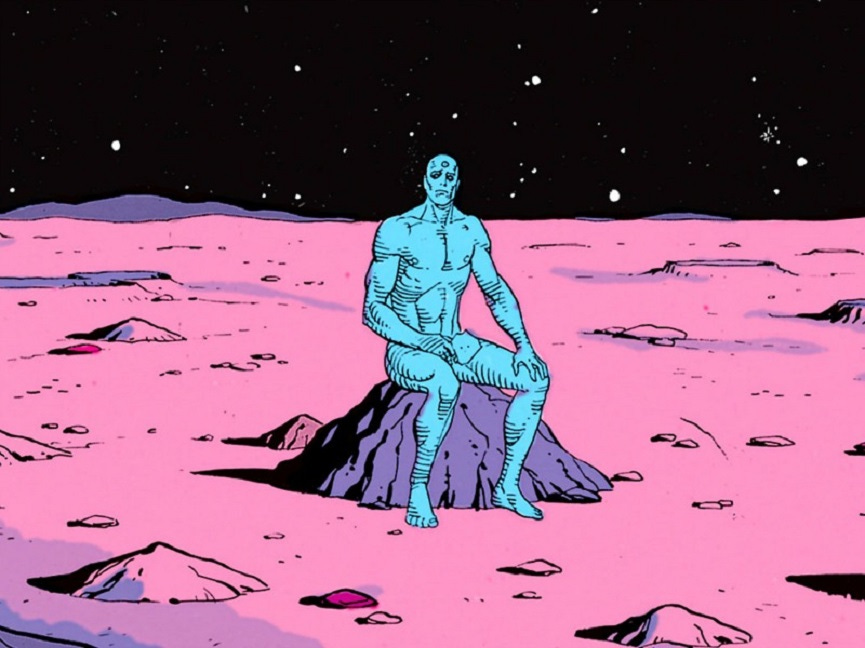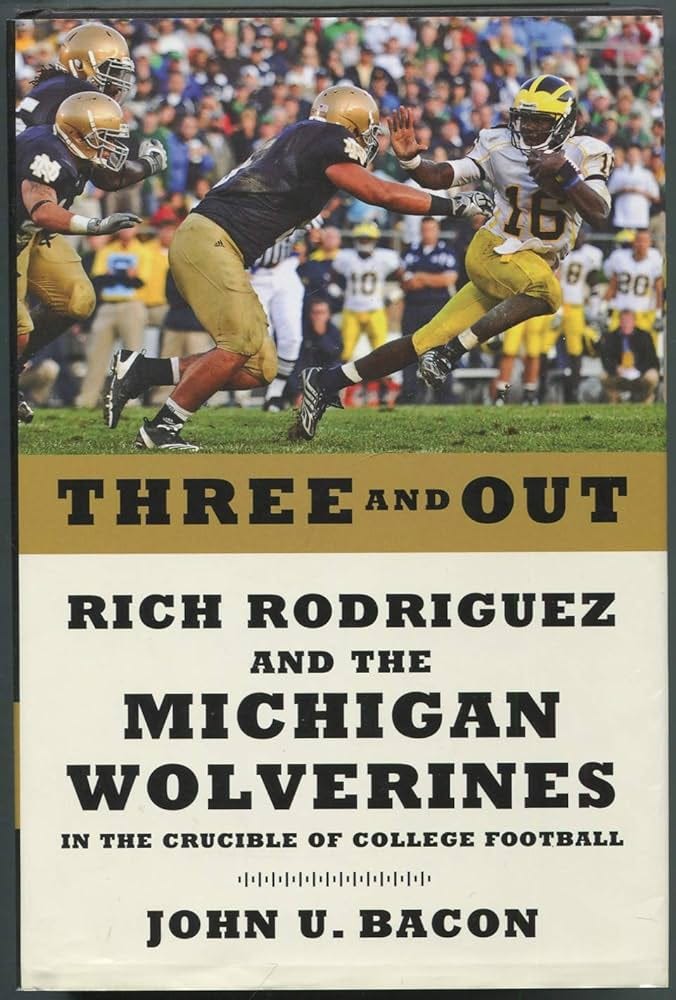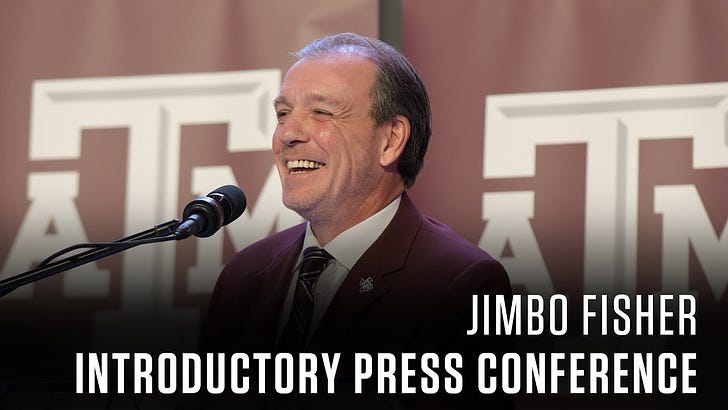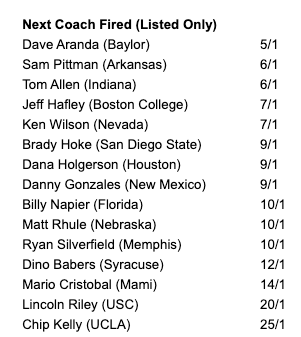Pac-12 Tuesday: USC and the Perpetual Pursuit of Perfection
In Alan Moore’s revolutionary 1986 comic The Watchmen, an accident during government-led nuclear testing causes the death of physicist Jonathan Osterman — and his rebirth as the atomic, godlike entity Dr. Manhattan.
A panel from the comic has become a popular meme in recent years. The text often accompanying it, in which Dr. Manhattan somberly laments cycles repeating, doesn’t actually appear in Moore’s work.
Nevertheless, the frame has become synonymous with history doomed to repeat itself. The significance of Dr. Manhattan specifically is that, through his immortality, he sees humanity repeat cycles of fear, paranoia, greed and violence over and over without learning lessons.
My first season covering USC Trojans football professionally was 2013. The last in which I was on the beat in a real capacity was 2021. Both campaigns were noteworthy for September firings and subsequent coaching searches that overshadowed the conclusion of the schedule.
Those two falls ended with much different hires and ensuing reactions. A radio show had me on as a guest in October 2013 to discuss Lane Kiffin’s firing and kick around potential replacements to lead USC.
Steve Sarkisian was mentioned, and I scoffed a bit. While a less ridiculous suggestion than Jack Del Rio, firmly entrenched as an NFL coach yet frequently bandied about for having been a USC alum, Sarkisian didn’t make sense to me.
He was in his fifth season at Washington then. Sarkisian had inherited a dire situation, taking over a Huskies program coming off an 0-12 finish in 2008. UW showed promise early into his tenure, but plateaued almost instantly.
And then…USC hired Steve Sarkisian.
It made no sense to me, as if Trojans athletic brass had decided to fire Lane Kiffin — a former Pete Carroll offensive coordinator who returned to USC with an uninspiring head-coaching resume — and replace him with Lane Kiffin.
Now, if you ever read John U. Bacon’s book “Three & Out,” which I highly recommend, it follows Michigan football during Rich Rodriguez’s tenure as head coach from 2008 through 2010. Among the book’s central themes is those with power and influence at the university being fixated on the concept of The Michigan Man.
I would need to write a whole other newsletter entry to detail what being a Michigan Man entails, but the short explanation is someone with direct ties to past Wolverines greatness who operated in a way patterned after said greatness.
By virtue of having neither trait, Rodriguez was arguably doomed to fail before he ever arrived in Ann Arbor.
USC doesn’t have the specific branding of Michigan Man, but in following multiple coaching searches closely, I heard a lot of discussion of the athletic department needing to hire A Trojan.
That meant someone with ties to the program’s past glory: Either a former playing great, ergo the Jack Del Rio suggestions1, or a coach from a championship-winning staff.
And since the previous 30 years of USC football were marked with the tenures of Ted Tollner, Larry Smith, the second John Robinson era and Paul Hackett, the clear implication was a former Pete Carroll assistant.
Of course, it’s no profound revelation that when Carroll was hired before the 2001 season, he wasn’t A Trojan and certainly wasn’t a ballyhooed hire in football media.
Jimbo Fisher, Jedd Fisch and Why It's Best to Admit You Don't Know the Future
Every November signals the unofficial beginning of the college football coaching carousel season, and the first high-profile seat on the ride opened Sunday morning with Texas A&M’s dismissal of Jimbo Fisher. As the attraction starts to twirl, the accompanying carnival tune comes from the chorus of pundits offering up lists of potential yet mostly unrealistic candidates, declaring the attractiveness of open positions and grading the quality of hires before any of them coach a game.
Nevertheless, there seemed to be a hang-up with recreating the Carroll era, using supporting cast from the era, and employing the same strategies of the era despite college football collectively moving away from the style.
In his introductory press conference a decade ago, Sarkisian made a point of emphasizing he would employ a power-based offensive approach and utilize tight ends, addressing one of the more vociferous gripes from USC boosters about Kiffin’s tenure.
Coincidentally, the program most synonymous at the time with winning using such an approach, Alabama, lost the Sugar Bowl to Oklahoma the following month. Former Crimson Tide assistant Mario Cristobal revealed to a handful of us media-types at 2018 Pac-12 media that the 2014 Sugar Bowl specifically motivated Nick Saban to abandon the traditional pro-style offense and implement a more spread-based look…which led to the hires of Lane Kiffin and later, Steve Sarkisian, as Alabama offensive coordinator.
Another coincidence stemming from that Sugar Bowl: Sooners coach Bob Stoops hired then-East Carolina assistant Lincoln Riley as offensive coordinator to further modernize the Oklahoma offense.
First as offensive coordinator in 2015 and 2016, then succeeding Stoops as head coach in 2017, Riley’s offenses helped send four players to the Heisman Trophy ceremony and produced two winners, while landing Oklahoma in the College Football Playoff five times in six seasons.
USC’s hire of Lincoln Riley nearly two years ago was the antithesis of the Sarkisian hire. It signaled a move away from fixation on finding A Trojan and trying to replicate the Carroll era.
I’ve observed Riley’s tenure, the second season of which nears a conclusion with the final Pac-12-era installment of Los Angeles’ last remaining college football showcase, like Dr. Manhattan viewing mankind from the moon.
Two-Team Town: A History of College Football in Los Angeles
Maybe it’s the San Gabriel Mountain backdrop against which the Rose Bowl sits, or the iconic Hollywood sign and skyscrapers of downtown Los Angeles visible from Los Angeles Memorial Coliseum. Perhaps credit belongs to the contrast of USC’s cardinal-and-gold against UCLA’s blue-and-gold, making for what’s undeniably the most aesthetically pleasing unifor…
USC heads into this year’s edition of the Crosstown Showdown at 7-4. A loss to UCLA would send the Trojans to a regular-season mark of 7-5, the same record with which the 2012 team finished.
A 2012 team that, like the 2023 Trojans, were coming off of a double-digit-win season and projected for national championship contention.
A 2012 team that, like the 2023 Trojans, returned a quarterback who rewrote records in his time at USC.
Lane Kiffin was officially fired early on a Sunday morning in September 2013, but his tenure ended with the 2012 season’s collapse that included losses to rivals Notre Dame and UCLA.
Stock should be placed into gambling companies’ press releases conservatively; their emails touting low-level bets like Heisman odds and coach firings are intended mostly to drum up conversation. Still, Riley’s name appearing on a BetOnline sheet sent out less than 48 hours following a loss to Oregon doesn’t seem entirely outlandish. H/T Shotgun Spratling:
A decade’s gone by. USC changed its approach. And here I am, on the moon, watching a cycle it feels I’ve never left.
It is 2013. USC supporters are disgruntled with the direction of the program. It is 2015. USC supporters are disgruntled with the direction of the program. It is 2018. USC supporters are disgruntled with the direction of the program. It is 2019. USC supporters are disgruntled with the direction of the program. It is 2023. USC supporters are disgruntled with the direction of the program.
Del Rio played linebacker on the 1984 Pac-10 championship and Rose Bowl-winning Trojans.








